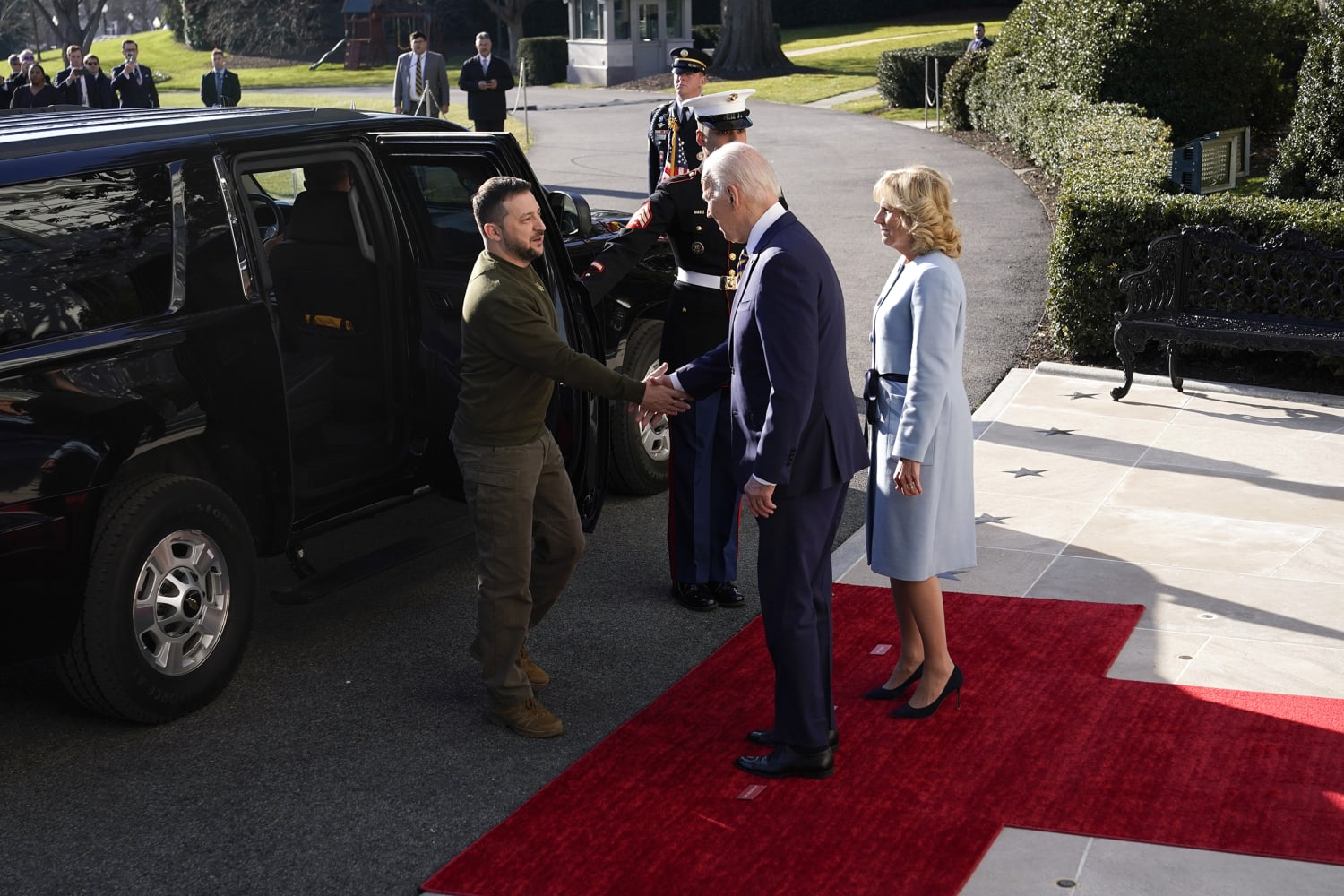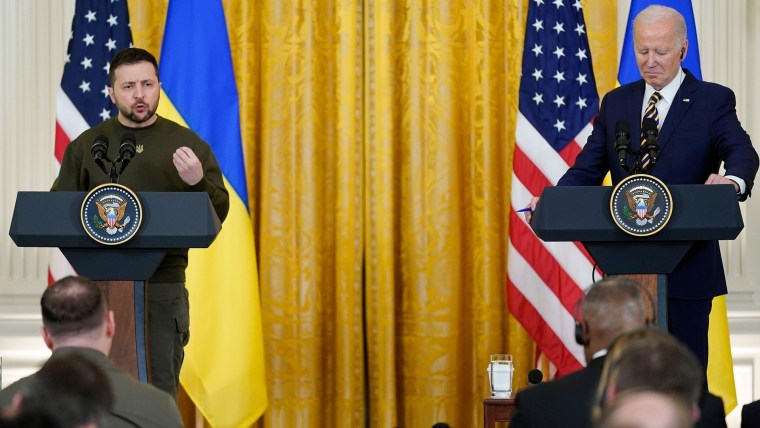Ukrainian President Volodymyr Zelenskyy’s surprise visit to Washington Wednesday was designed to bolster the Ukrainian leader with a show of solidarity as well as financial and military support in the face of a relentless Russian attack and a bitter winter.
President Joe Biden literally rolled out the red carpet for Zelenskyy, who was greeted in the White House driveway by the president and first lady and quickly ushered into the Oval Office for a bilateral meeting and a joint press conference. Zelenskyy then received a rousing welcome on Capitol Hill before he made a prime-time address to a joint meeting of Congress.
In the new year the countries might find that their interests lie on increasingly divergent tracks. Washington should take care to ensure it isn’t dragged down the wrong one.
The ceremonial solidarity seems to reflect the United States’ internal policy well. America has been Ukraine’s primary security benefactor since Russian President Vladimir Putin opted for a war of choice that is failing in all respects. Washington has showered more than $21 billion of security aid to the Ukrainian military, from High Mobility Artillery Rocket Systems (HIMARS) and Switchblade drones to Stinger anti-aircraft systems.
This week, the Biden administration announced another $1.8 billion in weapons that for the first time include the Patriot anti-missile defense system. There will be more U.S. security assistance going forward: The annual spending bill released by Congress this week would provide Kyiv with an additional $45 billion in support, even more than President Joe Biden requested.
Senior U.S. officials across the national security bureaucracy also remain steadfast proponents of Ukraine. As Secretary of State Antony Blinken reiterated during a Nov. 30 press conference, “Our collective resolve to support Ukraine is and will continue to be ironclad … for as long as it takes for Ukraine to succeed.” Defense Secretary Lloyd Austin has stated emphatically that the U.S. is focused on assisting Ukraine’s efforts “to take back every inch of their sovereign territory.”
But this unity doesn’t go as deep as it seems, whatever the images coming out of Washington on Wednesday suggest. In fact, in the new year the countries might find that their interests lie on increasingly divergent tracks. Washington should take care to ensure it isn’t dragged down the wrong one by a frantic sense of urgency to see Russia defeated and humiliated. Now is a good time to be honest about the limited extent of U.S. military and financial support to the Ukrainians, how long this support can last and — just as critically — how we would like the nearly yearlong war to end.
While the White House has been clear that it wants Russia to lose, it doesn’t necessarily want Russia to lose too quickly for fear Putin, with his back against the wall, will lash out in a desperate attempt to stave off defeat. Biden has been right not to cave to the criticism of those pundits and unnamed U.S. officials who have faulted the administration for allowing Putin’s bellicose threats to deter more sophisticated U.S. weapons shipments to the Ukrainians. While it’s difficult for many to envision Putin using a tactical nuclear weapon, such a scenario isn’t impossible, if still very unlikely.
The truth is none of us know for certain what Putin will do. Yet Zelenskyy is loudly clamoring for more U.S. advanced weapons, no doubt frustrated that the lingering threat of escalation is dissuading the U.S. from providing him the long-range weapons systems he believes are required to strike Russian military facilities, enhance Ukraine’s air defense and ultimately win the war.
The U.S., however, has other national security priorities beyond aiding a Ukrainian military victory, however morally satisfying it would be. The U.S., for example, has core interests in preventing the war from spreading into NATO territory, preserving a sense of predictability with Russia in keeping nuclear weapons off the table and maintaining communication with Russia to avoid unnecessary accidents that could lead to a major crisis. U.S. policymakers can’t afford to focus exclusively on Ukraine’s best interests as they fine-tune and execute their policy to secure America’s.
Given these priorities, the Biden administration would prefer the war in Ukraine end in a diplomatic settlement to short-circuit a long, drawn out and even more catastrophically destructive war. U.S. national security adviser Jake Sullivan reportedly encouraged the Ukrainian government to at least be more open to the prospect of talks with Russia. During a joint press conference with French President Emmanuel Macron, Biden said he would “be happy to sit down with Putin” if the Russian leader was genuine in finding a way out of the war.
Until now, however, Biden and his aides have been extraordinarily reluctant to be seen as dictating terms to the Ukrainians. When Chairman of the Joint Chiefs Gen. Mark Milley suggested that talks between Moscow and Kyiv would be appropriate during the lull in fighting that the winter weather is expected to bring, the administration distanced itself from the comments by assuring Kyiv that it, and it alone, had the power to determine when those talks occurred.
Zelenskyy isn’t interested in a settlement unless every Russian soldier leaves every inch of Ukrainian territory, though, which means the U.S. is essentially giving him a veto on whether diplomacy happens. The most powerful nation in the world might start to tire of giving such great deference to Zelenskyy, even if he is Time’s Person of the Year.
As the Russians continue to build up their defensive positions and throw hundreds of thousands of additional recruits into the fight, the prospect of more Ukrainian counteroffensives similar to what the world saw in Kharkiv and Kherson, where they forced Russian troops to withdraw, are unlikely in the near to medium term.
More probable is that a stalemate takes hold over the next few months while the casualties pile up for both sides. The Ukrainian economy, already suffering from a 35% contraction, would get worse. And U.S. lawmakers, understandably, may grow tired of indefinitely writing checks in the tens of billions of dollars as allies in Europe fail to do the same.
Indeed, with Republicans taking control of the House next year, skepticism of U.S. aid for Ukraine is likely to intensify. Likely incoming House Speaker Kevin McCarthy is promising no more blank checks for Ukraine, while Rep. Michael McCaul, the incoming chairman of the House Foreign Affairs Committee, is seeking increased oversight of where U.S. taxpayer dollars are headed and how they are being spent, even as he supports the spending itself.
Zelenskyy’s appearance on Capitol Hill and the raucous standing ovation he was greeted with have masked all of these differences for the moment. But they could — and should — be out in the open in the new year.
Source: | This article originally belongs to Nbcnews.com











